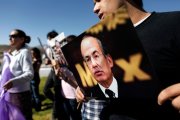
Reuters
A protester in Saltillo Thursday held a photo of President Calderón.
|
 Alleged Drug War Tactics Under Fire
Alleged Drug War Tactics Under Fire
By JOSÉ DE CÓRDOBA
MEXICO CITY—Five years after Mexican President Felipe Calderón declared war on the country's violent drug traffickers, his government is fighting accusations by human-rights activists that it allowed the killing, torture and kidnapping of civilians in its drug war.
While the government denies systematic abuses, mounting reports of such cases could erode popular support for the offensive by Mr. Calderón. And with Mr. Calderón's legacy largely built on his fight against organized crime, the reports could also hurt his party's bid to hold on to the presidency in elections next year.
Netzai Sandoval, a Mexican human-rights lawyer, asked the International Criminal Court in The Hague on Nov. 25 to investigate Mr. Calderón and top security officials—along with leading drug lords—for alleged war crimes.
The request came with a petition signed by more than 23,000 people, led by a group of mostly leftist academics, jurists and journalists.
Two days later, Mr. Calderón responded, threatening a libel suit against activists who joined Mr. Sandoval in arguing for the case at The Hague.
"The Government of the Republic is exploring all alternatives to proceed legally against those who realize these acts in national or international forums," said the statement by Mr. Calderón's office. His government took out full-page newspaper ads on Monday, saying the accusations were groundless and printing the threat of a libel suit. Late Friday, Mexico's Interior Ministry issued a communiqué that said the Mexican government wouldn't initiate legal proceedings against the petitioners, but would leave it to individual public officials to take legal action if they so desired "against the libelous allegations spewed out before national and international public opinion."
The ICC's top prosecutor has said only that the ICC has received the petition—which some experts say has little chance of being admitted by the court.
"The ICC mechanism of admissibility is incredibly rigorous and demanding," says José Vivanco, head of Human Rights Watch's Americas division. A decision on whether even to consider the petition could take years, he said.
The petition says the abuse by the Mexican state is systematic. The petition names Mr. Calderón and his top security officials for at least 470 specific cases of human-rights abuses.
A recent Human Rights Watch report said it found strong evidence of participation of security forces in 170 cases of torture, 39 disappearances, and 24 incidents of extrajudicial killings.
Since Mr. Calderón took office five years ago, 46,000 people have died in drug-related violence, most of it, according to the government, between rival cartels fighting for turf. The president has sent 45,000 troops to try to quell the violence and reclaim territory from drug lords. He has also tried to improve the local and federal police forces.
But with every passing year, the violence has increased. So have allegations that in some cases, soldiers and police, frustrated by a weak and corrupt judicial system, are taking the law into their own hands by using excessive force in fighting suspected criminals.
The Mexican government says that whatever human-rights violations have taken place in its campaign against the drug cartels have been neither systematic nor part of an institutional strategy. It says the government has supported legal efforts to punish human-rights violators.
The administration's threat of a libel suit prompted some well-known Mexicans to launch a second petition to defend the group that initially called for an ICC case. "It is extremely worrying that [the government] pretends to intimidate petitioning citizens by taking legal actions against them," the petition read.
Since then, a few dozen petitioners have demonstrated in front of the Attorney General's office in Mexico City, demanding to be arrested for signing the document.
The events have made Mr. Calderón appear intolerant of criticism, some analysts say.
"You would expect a government to say the complaint is groundless and frivolous," says Mr. Vivanco. "But it's a big mistake to overreact by suggesting the government will take legal action against those who have promoted the complaint."
Jorge Montaño, a former Mexican ambassador to the United Nations who is allied with the political opposition, called the government's reaction "a monumental excess….This shows there is little tolerance about what citizens may think of the struggle against drug trafficking."
Most Mexicans—81%—agree that the army should be used to combat drug traffickers, according to a poll published Thursday by Mexico's leading newspaper, Reforma. But 58% of those polled said they believed human rights were being violated in the drug war; 51% thought the government was losing the conflict, compared to 29% who thought it was winning.
The longer Mexico keeps the armed forces in the conflict, the greater the possibility that the prestige of the military—one of the country's most respected institutions—will be tarnished by accusations of human-rights violations and drug-related corruption, said Bruce Bagley, an expert on Latin America and drug trafficking at the University of Miami.
The petition also blames Mexico's leading drug lords, including Joaquin "El Chapo" Guzman, the leader of the Sinaloa cartel, the country's most powerful criminal, for the violence.
The slim chance that an ICC case would proceed didn't stop Mr. Calderón's combative Labor Secretary Javier Lozano from writing a newspaper column that personally attacked the activists who organized the ICC letter.
In one case, Mr. Lozano said he didn't respect one organizer's intellectual abilities.
Mr. Lozano said the more than 23,000 people who signed the petition had been "duly indoctrinated." He said the activists, many of whom backed Andrés Manuel López Obrador, the left's losing candidate in the last presidential election, were sore losers seeking revenge. Mr. Lopéz Obrador is again running for president in 2012; Mr. Calderón is barred by the Constitution from pursuing re-election.
(2011-12-3/online.wsj.com)
|





